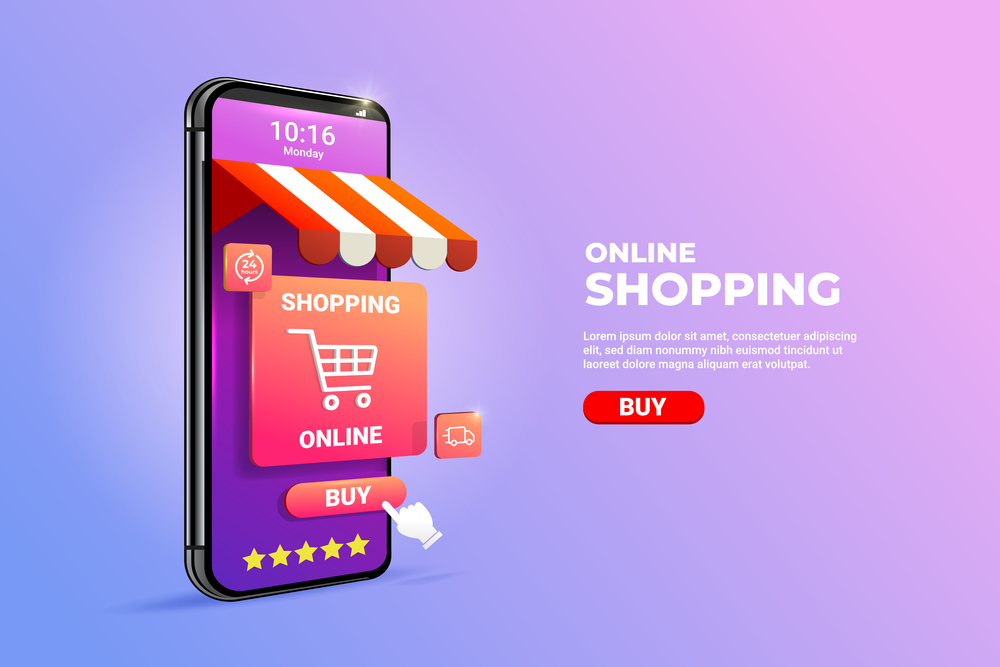
Mobile App or Website for your ECommerce store?
A Guide for E-Commerce Entrepreneurs
In the digital era, establishing an online presence is vital for the success of any business. For e-commerce businesses, choosing the right platform to engage customers and drive sales is a crucial decision. Two popular options are mobile apps and websites. Both offer unique advantages and cater to different user preferences. This blog aims to explore the pros and cons of each platform, helping you make an informed decision on whether to opt for a mobile app or a website for your e-commerce business.
I. Mobile Apps for E-Commerce

Mobile apps have gained immense popularity in recent years thanks to the widespread use of smartphones. Here are some compelling reasons to consider developing a mobile app for your e-commerce business:
- Enhanced User Experience: Mobile apps offer a more personalized and interactive experience compared to websites. They allow for seamless navigation, smooth animations, and customized features that cater to individual user preferences.
- Increased Customer Engagement: With push notifications, mobile apps enable direct and instant communication with users. This helps in promoting new products, sending personalized offers, and enhancing customer engagement and loyalty.
- Improved Performance: Mobile apps can utilize the device’s hardware and operating system features, resulting in better performance, faster load times, and offline functionality. This enhances user satisfaction and can lead to increased conversion rates.
Despite these benefits, mobile apps also present some challenges:
- Development and Maintenance Costs: Developing a mobile app can be expensive, especially if you aim to support multiple platforms (iOS and Android). Additionally, ongoing maintenance and updates may require further investment.
- App Store Approval: Publishing a mobile app requires adherence to specific guidelines and approval processes, which can sometimes be time-consuming and restrictive.
II. Websites for E-Commerce

Websites have long been the traditional choice for e-commerce businesses. Here are some reasons why websites continue to be a popular option:
- Wider Reach and Accessibility: Websites are accessible across various devices, including desktops, laptops, tablets, and smartphones. This broadens your potential customer base and ensures a consistent experience, regardless of the device used.
- Lower Development Costs: Compared to mobile apps, website development costs are generally lower. Numerous platforms and tools are available to build and maintain e-commerce websites efficiently.
- Search Engine Optimization (SEO): Websites can be optimized for search engines, making it easier for potential customers to discover your products or services through organic search results. SEO techniques can help improve your website’s visibility and drive targeted traffic.
Websites, however, also have their limitations.
- Limited User Engagement: Websites typically lack the interactivity and personalization offered by mobile apps. This can result in reduced customer engagement and potentially lower conversion rates.
- Higher Bounce Rates: Mobile users often prefer the convenience of apps over websites, and they tend to have lower patience for slow-loading pages or cumbersome navigation. This can lead to higher bounce rates and missed opportunities for conversion.
III. Choosing the Right Platform

When deciding between a mobile app and a website for your e-commerce business, consider the following factors:
- Target Audience: Analyse your target audience’s demographics, preferences, and behaviour. If your audience primarily uses smartphones and values personalized experiences, a mobile app may be the right choice. If they are more diverse in terms of devices used, a responsive website would be a better option.
- Budget and Resources: Evaluate your available budget and resources. Mobile app development requires more investment, both in terms of time and money. If you have limited resources, starting with a website and gradually expanding to a mobile app can be a viable strategy.
- Business Goals: Consider your long-term business goals. If you aim to create a highly immersive and engaging shopping experience, a mobile app may be the ideal choice. However, if your primary objective is to establish an online presence quickly and cost-effectively, a website may be a more practical option.
Mobile App or Website for Your Ecommerce Store? Which one is better, and why?
When considering whether a mobile app or a website is better for your e-commerce store, it’s important to evaluate your specific business needs, target audience, and long-term goals. Both platforms offer unique advantages and cater to different user preferences. Let’s delve deeper into the comparison to help you make an informed decision:
- User Experience:
Mobile App: Mobile apps provide a highly personalized and interactive user experience. They can leverage the device’s features, such as push notifications, gestures, and camera integration, to create seamless and engaging interactions.
Website: Websites offer a broader reach across various devices and browsers. They can provide a consistent user experience regardless of the platform used, ensuring accessibility for a wider audience.
- Customer Engagement:
Mobile App: Mobile apps enable direct and instant communication with users through push notifications. They allow for personalized offers, exclusive discounts, and loyalty programmes, fostering a deeper level of engagement and customer loyalty.
Website: Websites can engage customers through compelling content, interactive features, and easy navigation. However, they may not offer the same level of direct and personalized communication as mobile apps.
- Development and Maintenance Costs:
Mobile App: Developing a mobile app can be more expensive, especially if you aim to support multiple platforms (iOS and Android). Additionally, ongoing maintenance and updates require continuous investment.
Website: Building and maintaining a website is generally more cost-effective compared to a mobile app. Numerous platforms and tools are available that offer efficient website development and management.
- Reach and Accessibility:
Mobile App: Mobile apps primarily target smartphone users and can offer enhanced performance, offline functionality, and a more immersive experience. However, they may have limitations in reaching a broader audience.
Website: Websites are accessible across various devices, including desktops, laptops, tablets, and smartphones. This wider reach ensures that potential customers can access your store regardless of the device they use.
- Speed and Performance:
Mobile App: Mobile apps can leverage the device’s hardware and operating system, resulting in better performance, faster load times, and smoother interactions. Offline functionality can also provide a seamless experience.
Website: Websites rely on internet connectivity and can be affected by factors such as server speed, network congestion, and device capabilities. Optimizing website performance is crucial to providing a fast and smooth browsing experience.
Ultimately, the choice between a mobile app and a website depends on your specific business requirements. Consider factors such as your target audience’s preferences, budget, long-term goals, and desired level of engagement. In some cases, a combination of both platforms might be the optimal solution, starting with a website to establish a strong online presence and gradually expanding to a mobile app to provide a more immersive and personalized experience for loyal customers.
- E-commerce Features and Functionality:
Mobile App: Mobile apps can leverage the device’s capabilities to offer enhanced features and functionality. For example, apps can utilize the camera for barcode scanning, implement fingerprint or facial recognition for secure authentication, or integrate with location services for personalized recommendations. These additional features can elevate the shopping experience and streamline the purchasing process.
Website: While websites may not have access to all the device-specific features, they can still provide robust e-commerce functionality. Modern e-commerce platforms offer a wide range of features, such as product catalogues, shopping carts, secure payment gateways, order tracking, and customer support. These features are essential for facilitating smooth transactions and managing the customer journey.
- Search Engine Visibility:
Mobile App: Mobile apps are not inherently discoverable through search engines. App store optimization (ASO) techniques need to be employed to improve visibility within the respective app stores. This requires optimizing app titles, descriptions, keywords, and ratings to increase the likelihood of app discovery by users.
Website: Websites can be optimized for search engines through search engine optimization (SEO) techniques. By focusing on keyword research, on-page optimization, quality content creation, and backlink building, websites can improve their visibility on search engine results pages (SERPs). Higher visibility can attract organic traffic and potentially increase sales opportunities.
- Speed of Implementation:
Mobile App: Developing a mobile app typically requires more time compared to building a website. App development involves designing user interfaces, implementing functionality, testing across multiple devices, and obtaining app store approvals. This process can be time-consuming, especially for complex apps or when targeting multiple platforms.
Website: Building a website is generally faster and more straightforward compared to mobile app development. With various website builders, content management systems (CMS), and e-commerce platforms available, you can quickly set up a functional website with pre-designed templates and customization options.
- Platform Independence:
Mobile App: Developing separate apps for iOS and Android platforms allows you to cater to a broader audience. However, it also requires additional development resources and ongoing maintenance to keep up with updates and changes in operating systems and app store guidelines.
Website: Websites offer platform independence, allowing users to access your e-commerce store across different operating systems and devices. This flexibility ensures a consistent experience for users, regardless of the platform they choose to browse or shop on.
- User Adoption and Retention:
Mobile App: Mobile apps can help increase user adoption and retention due to their personalized experiences and direct access to users through push notifications. Once users download and install your app, they are more likely to engage with your brand on a regular basis, resulting in higher customer retention rates.
Website: Websites may face challenges in capturing user attention and retaining customers compared to mobile apps. However, by implementing effective UX design, intuitive navigation, and personalized content, you can create a compelling website experience that encourages repeat visits and fosters customer loyalty.
Conclusion
In the mobile-first era, both mobile apps and websites offer unique advantages for e-commerce businesses. While mobile apps provide enhanced user experiences and increased engagement, websites offer a wider reach and accessibility. The choice between the two depends on factors such as target audience, budget, and long-term goals. It’s important to carefully evaluate your specific requirements before making a decision. Remember, a well-designed and user-friendly platform, whether it’s a mobile app or a website, is crucial for attracting and retaining customers in the competitive e-commerce landscape.
FAQs
- How do I find a reliable mobile app development company in India?
Conduct thorough online research, explore their portfolios, and read client testimonials to assess their expertise. Seek recommendations from industry professionals and consider using online directories and review platforms to find reputable companies.
- What factors should I consider when selecting a web development company in India?
Evaluate their expertise in web development technologies, check their portfolio for relevant projects, assess their communication skills, and consider their pricing and timelines. Request client references to gain insights into their professionalism and project management abilities.
- Should I choose a mobile app or a website for my eCommerce store?
The choice depends on your target audience and business goals. If your target audience primarily uses mobile devices and you want to provide a personalized, seamless shopping experience, a mobile app may be suitable. If you aim for a broader reach and want to optimize for search engines, a website is a good choice.
- What are the advantages of a mobile app for an eCommerce store?
Mobile apps offer features like push notifications, personalized user experiences, and easy access to device functionalities like camera and GPS. They can enhance customer engagement, loyalty, and provide a more immersive shopping experience.
- What are the advantages of a website for an eCommerce store?
Websites are easily accessible on various devices and platforms, making them more inclusive. They can be optimized for search engines, making it easier for potential customers to discover your store. Websites also provide flexibility for updates and maintenance.